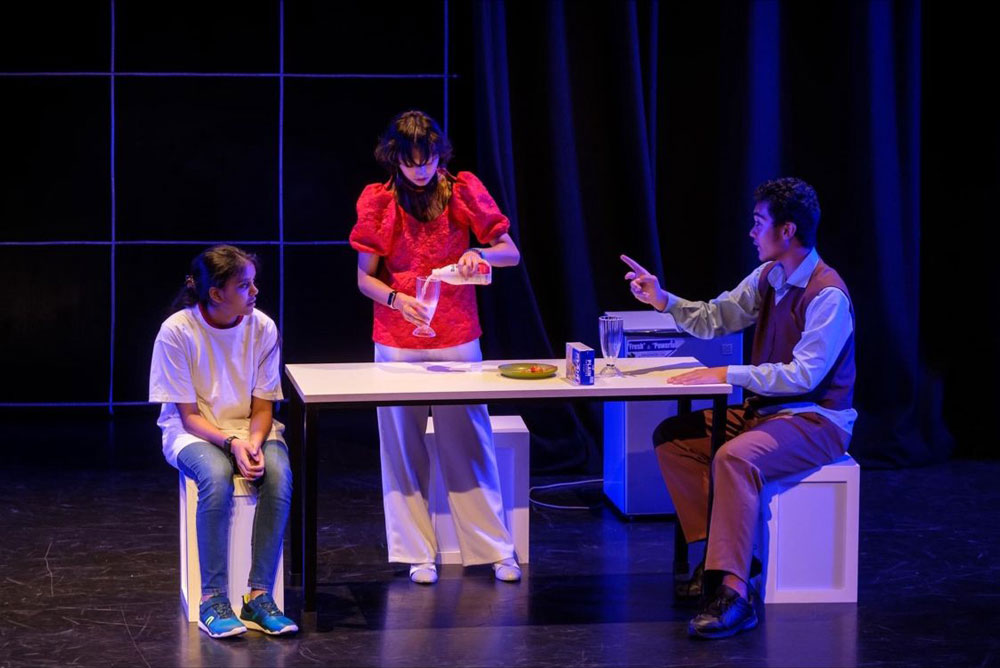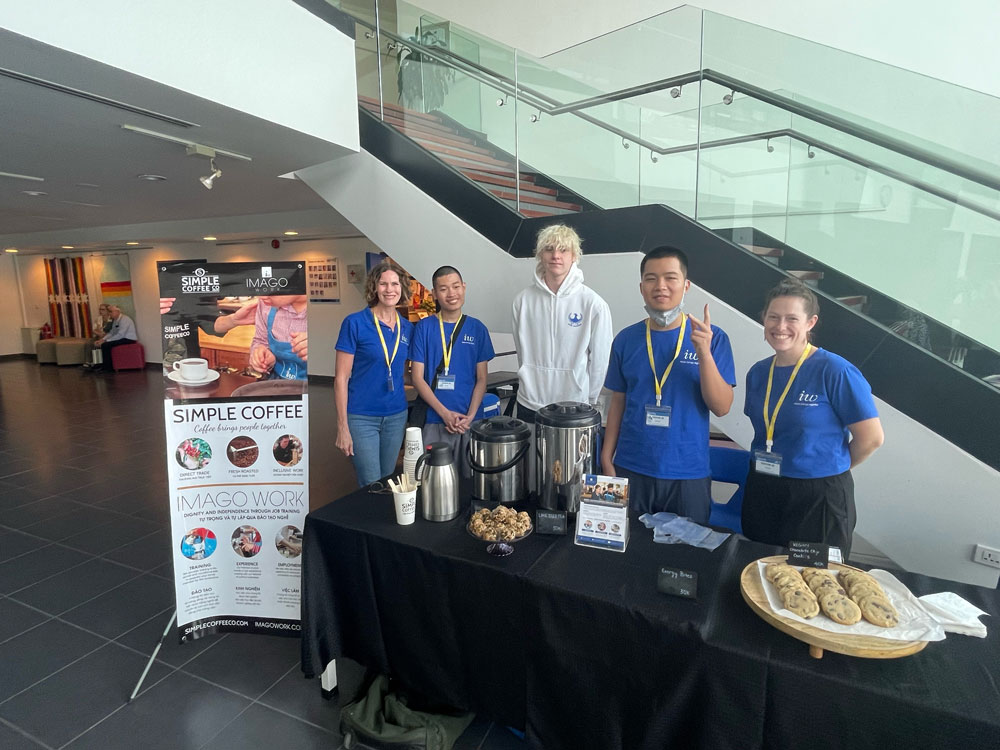
(Photo source: Sarah Garner)
---------------------------------------------
My school’s vision is that our learning community will be an inspirational role model for a better world. As a founding member of the SENIA International Youth Board, I am proud to be taking action to create an inclusive world for us all to live in.
UNIS Hanoi’s High School drama department recently put on a production of The Curious Incident of the Dog in the Nighttime. This play depicts Christopher/Christina (depending on the actor playing the role), a 15-year-old with an amazing brain, and their detective expedition to investigate the mystery death of Wellington, the neighbor's dog.

Before we began working on the play, the school leadership discussed it with various community stakeholders including the Parents’ Association’s Neurodiverse Families’ group and SENIA Vietnam. Dr. Jeff Leppard, our Secondary School Principal said, “As a school, it is important that our students be able to put on a play that represents neurodiverse people, and it was equally important we ensure that the production not suggest that neurodivergent people are all alike and that our protagonist is merely one example of the beautiful variety and complexity of people.”
Being part of the SENIA International Youth Board, I wanted to connect with the larger community on this issue as well. I knew that there was a vocational training program nearby our campus, run by IMAGO work, which aims to create work opportunities for neurodivergent young adults and more inclusive workplaces throughout Vietnam. This is happening on my campus, with two IMAGO Work students interning at UNIS Hanoi. Duong works in the canteen’s cafe and Minh works in the library. I met with Michelle Beard, one of IMAGO Work’s founders, and both students to discuss a collaboration of providing refreshments and raising awareness and promoting acceptance of neurodivergent people in everyday work situations. We agreed it would be a fun and useful activity. We also asked Morgan Dobroski, my learning support teacher and a SENIA Vietnam Board member, to speak to the audience before the shows started. We wrote information to be included in the program, including introducing the IMAGO work students to the community and asking people to say hello if they see them working and ask how they are doing in order to foster deeper connections and friendships.

As a neurodivergent teacher, Ms. Morgan was very proud to be involved, saying, “Being part of the movement to create more inclusive spaces is very important to me, and getting to work alongside students who also value inclusion makes me proud to be a teacher in this community.”
Putting on this particular show was also very important to the director, Georgia Crinis, who shared in the playbill that her “brother, Mathew, is on the spectrum and growing up with him as children in the 1980s, when inclusivity and diversity, were not at the forefront of education, meant that he was left to feel ‘not normal’ or ‘different’ and therefore was isolated too many times. It is important to me that all students see themselves on the stage and/or in the stories presented, either through a window, a mirror, or a sliding glass door. I chose to direct The Curious Incident of the Dog in the Nighttime because the protagonist is neurodivergent and because the story is told from the perspective of Christina (played by Shatakshi Suruchi). When casting the play, I chose the students based on their reading of the characters.”
The student actors rehearsed for several months to prepare for the performances. They learned a lot from this experience, especially the student who played the lead role, who said:
“To be honest, I found it to be a unique experience as it was the first time. Also, I was representing something that I wasn't and the fact that other people would base their understanding of an autistic person and their struggles on this show made me feel I had a big responsibility as I didn't want to show any stereotype or any misinterpretations. This was also a great growth in my personal mindset as before the show I had a stereotype of autistic people and made an assumption about how they looked, their behaviors, and how they thought all based on a past classmate I had who had autism so I am deeply grateful to be in the production. ”
Audience members had lots of praise for the performers who portrayed characters in a truthful and intelligent way. Secondary school parent Steve Price-Thomas said, “'One of the things I learned was how all the signs and notices at Paddington railway station were experienced as a cacophony of information by the lead character. As a person who identifies as neurotypical, I had not considered how such visual information could be experienced differently by others. This is an important learning for me.'”
Duong said, "I loved seeing many friends that I know from serving drinks in the cafe! I hope I can participate in other events in the future!" Minh said, "There are so many people from different countries. I am curious to learn more about other cultures." I also really enjoyed this experience and look forward to further collaborations with Duong, Minh and the rest of the IMAGO students!
If your school or community puts this play on, here are some things to consider:
This play is both very popular but has also raised concerns. An Instagram response captures this tension well. However, any book or play is going to show some parts of the autism spectrum and not others. It's going to be partially representative but not inclusive of all characteristics. If a school uses this play as a way to introduce neurodiversity, part of the discussion needs to be that this is one representation and is about one person. That just like neurotypical characters in books, no one book represents everyone. That's a really important discussion to have, regardless of whatever story is being told.
Some people have concerns about non-neurodivergent actors playing neurodivergent characters. However, community stakeholders noted that professional acting/representation is different from high school theater as is the pool of available talent. SENIA country chapters could offer an age-appropriate workshop or training for the staff, student actors, stagehands, and even parents to know more about autism and neurodiversity in general.
In terms of making performances themselves accessible, Theater Development offers "autism-friendly" performances and provided educational activities for this play when it was on Broadway.
Community awareness, acceptance raising, and resources:
--------------------------------------------------------------
Sander van der Velden is in Grade 11 at the United Nations International School in Hanoi, Vietnam.